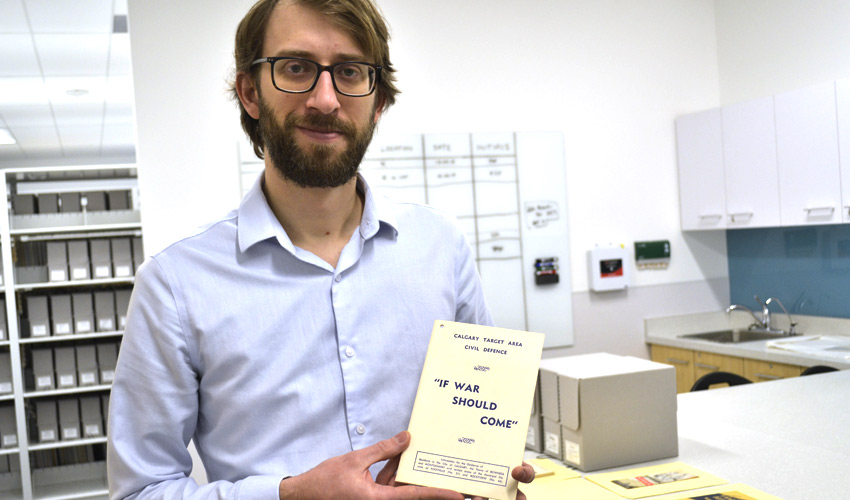MRU's Archives and Special Collections a direct link to history

A book or lecture can teach students about history, but a primary source can bring history to life.
Mount Royal University Archivist and Special Collections Librarian Peter Houston wants more faculty and students to take advantage of MRU's archival collections.
"I'm really trying to develop the archives instruction program here. I want to get classes in to use our amazing collections," Houston says. "This is an opportunity to allow undergraduate students to do some archival research with primary sources. When I did my history degree at UBC, in four years of an undergrad, we never went to an archives. It was always just in the classroom."
To that end, Houston has been working with faculty to bring classes to the Archives and Special Collections. Historian Joe Anderson, PhD, and associate dean of the Faculty of Arts, for example, worked with Houston to incorporate the Archives into his History 1100 classes.
During four sessions in the fall and winter terms of 2017/2018, Houston took students through the Archives' Canadian Cold War Pamphlet Collection.
"Joe and I developed an in-class exercise where students get into the Archives and work with historical sources," Houston says. "It's a way to get students doing hands-on work with records from the Cold War years when there was all the nuclear tension between the United States and the Soviet Union."
"They look at some of the documents produced at the time that spoke to popular fears about the bomb and how Canadians felt."
The Canadian Cold War Pamphlet Collection contains publications, many produced by the Canadian Government's civil defence program, to prepare civilians for the possibility of an atomic bombing, instructing them on how to stay calm, evacuate cities, or hunker down in bomb shelters.
"A lot of people were skeptical and asked, is this really going to protect us? But the government really tried, so we've got a number of pamphlets produced by different levels of government."
One published in Calgary in 1962 called If War Should Come instructs Calgarians on how to evacuate from the city if a nuclear attack was imminent.
Houston said some students were surprised Calgary was considered a target of long-range nuclear missiles. One student realized that in the event of an attack, Calgarians would have been evacuated to an area near her family farm.
As with any primary source, using the pamphlets requires some perspective and even a dose of skepticism as it differs from a book where a historian provides context and different points of views. However, the immediacy of the sources provides a direct link a book can't.
"Primary sources such as the civil defence pamphlets really help students connect with the time periods we study," Anderson says. "Students can recover the immediacy of historical events, to see things as people in the past saw them rather than from our vantage point in which we know how things turned out. The civil defence pamphlets reveal a lot about the past. We learn that government planners faced a nearly impossible task; how could they prepare people for the possibility of something as unthinkable and horrible as a nuclear attack without undermining the social and political order of things?"
'History in your hand'
Recently, Houston worked with Emily Hutchison, PhD, and her History 1100 class. Hutchison's research focus is medieval Paris, and recently some of her students were looking at the Archives' collection of medieval manuscript leaves produced by monks and scribes that are between 500 and 800 years old, while others perused the Cold War pamphlets.
"It's been immensely helpful," says Connor Mullins, a second-year student majoring in history, as he discussed one of the pamphlets with his group. "You can sit in a class and learn but there's nothing more rewarding than holding history in your hand."
Hutchison said the sessions introduce students to the basic mechanics of the discipline, specifically primary data used to analyze and to help undertake historical study.
"Rather than me lecturing and saying, 'This is what we do in the archives and when we look at a primary source we ask these questions,' I wanted them to actually touch and feel the documents," she says. "I also wanted them to see archivists, who are our siblings in professional terms, and see how we work together to preserve the historic record and how we make use of that record."
Better searches
Meanwhile, enhanced search functions on the Library website allow students and faculty to get a faster handle on what is located in the Archives and what they might want to take a closer look at in person on the fourth floor of the RLLC.
Archive Search mirrors the Library Search, for books and DVDs, allowing users to search the collection using search terms to find physical and content descriptions and digitized images of some archival items.
Digitization has made archives accessible for more people regardless of location, and Houston says efforts continue to digitize MRU's archival collections.
"We'll never get to point where we've digitized everything. It's a very time consuming process, but we have digitized some records that have real potential for high use and are particularly interesting."

